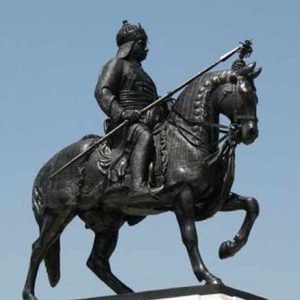


Dulla Bhatti, a celebrated figure in Punjabi folklore, was born on July 23, 1547, in Pindi Bhattian, Hafizabad, Punjab, Pakistan. His real name was Rai Abdullah Khan Bhatti. He hailed from a family of hereditary rural chiefs, known for their resistance against the Mughal Empire. His father, Farid, and grandfather, Sandal, were executed for opposing the Mughal land revenue system.
Dulla Bhatti’s life was marked by rebellion against Mughal Emperor Akbar’s centralized land revenue scheme. Raised with a strong sense of justice, Dulla Bhatti led a band of followers in a peasant insurgency, fighting against the Mughal authorities and wealthy landlords. His legendary acts of social banditry included redistributing wealth to the poor and rescuing young women from forced marriages, arranging their weddings, and providing dowries.
Dulla Bhatti’s compassion for the poor and his resistance against oppressive rulers made him a folk hero. He is often compared to Robin Hood for his acts of taking from the rich to aid the poor. His efforts extended to championing the rights of Punjabi women, ensuring their protection from exploitation.
Though largely absent from official historical records, Dulla Bhatti’s legacy lives on through Punjabi folk songs and stories. His resistance is seen as a peasant class war against Mughal tyranny. The Lohri festival, celebrated in Punjab, commemorates his memory, especially through the song “Sundri-Mundri,” which pays tribute to his deeds.
Dulla Bhatti was executed on March 26, 1599, in Lahore, but he faced his death with steadfastness, symbolizing his unwavering resistance to the Mughal Empire. His last words, as recorded by Sufi poet Shah Hussain, were a declaration of the spirit of Punjab. His grave at Miani Sahib Graveyard in Lahore remains a testament to his enduring legacy.
Dulla Bhatti’s story has inspired numerous works of literature and films in Punjabi culture. Plays, novels, and movies continue to celebrate his life and contributions. Despite the passage of centuries, Dulla Bhatti remains a symbol of courage, justice, and resistance against oppression in Punjabi folklore.